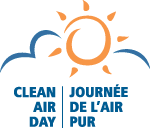Air Quality
Air Quality
Who Monitors Air Quality?
The Ontario Ministry of the Environment maintains a network of air quality monitoring stations throughout the Province. The Ministry's Air Quality Ontario office monitors air quality daily, issues alerts or warnings when smog levels are present and provides historical air quality information.
Tips For Making Clean Air Day Every Day
 Clean Air Day was proclaimed by the Government of Canada as the Wednesday of Environment Week, and was officially launched on June 2, 1999. The Day was declared in response to a request made by several community organizations across the country. Since the early 1990s, every year in May and June, environmental, health and transportation groups have organized clean-air related community activities.
Clean Air Day was proclaimed by the Government of Canada as the Wednesday of Environment Week, and was officially launched on June 2, 1999. The Day was declared in response to a request made by several community organizations across the country. Since the early 1990s, every year in May and June, environmental, health and transportation groups have organized clean-air related community activities.
Below are some tips for making every day "Clean Air Day."
Please select a heading from the following menu for further information:
Reduce vehicle use
Walk, cycle or take public transit. Emissions from cars, trucks and buses contribute greatly to Ontario's smog problem. Leave your car at home, if possible, or limit car trips by doing all your errands at once. Hold a teleconference instead of travelling to meetings. To reduce your exposure to exhaust fumes, stay away from heavy traffic areas when walking or cycling.
Drive clean
If you must drive, try carpooling. And keep your car well tuned. A well maintained car runs better and pollutes less. Shut the engine off, even for short stops - one minute of idling uses more fuel than restarting your engine. Drive at moderate speeds and check your tires regularly. Refuel your car after sundown when air pollution levels are lower and gasoline vapours won't add to the problem.
Turn off lights
Generating electricity contributes to smog, so remember to turn off the lights whenever you don't need them.
Turn down air conditioner
Air conditioning uses up energy, some of which is supplied by oil and coal-fired generators which emit pollutants that contribute to smog. Increasing the temperature in your home or place of work by a few degrees is a small price to pay to reduce hydro usage and help improve air quality.
Limit the use of small engine tools
You'd hardly think that mowing the lawn contributes to smog, but it does. Small gasoline engines in mowers, chain saws and leaf blowers emit high levels of pollutants that cause smog. On smog alert days put off mowing the lawn to another day. Use electric-powered or, even better, manual tools which don't produce any pollution.
Use air-friendly products
Avoid using aerosol sprays/cleaners, oil-based paints and other chemical products that contribute to poor air quality indoors and outdoors.
Don't light up on smog alert days
Whether it's lighting up your gas barbecue or, a cigarette, the smoke will only add more pollutants and further deteriorate air quality in and around your home. Take a break - don't smoke, and enjoy light meals that require little or no cooking.
The facts about smog pollution
Smog is a mixture of ground-level ozone, toxic gases and airborne particles that can damage both human health and the environment.
The contaminants that create smog are released during the combustion of fossil fuels in our vehicles, power plants, factory boilers and homes. They are also released by industrial processes, the evaporation of liquid fuels and the use of solvents and other volatile products such as oil-based paints.


